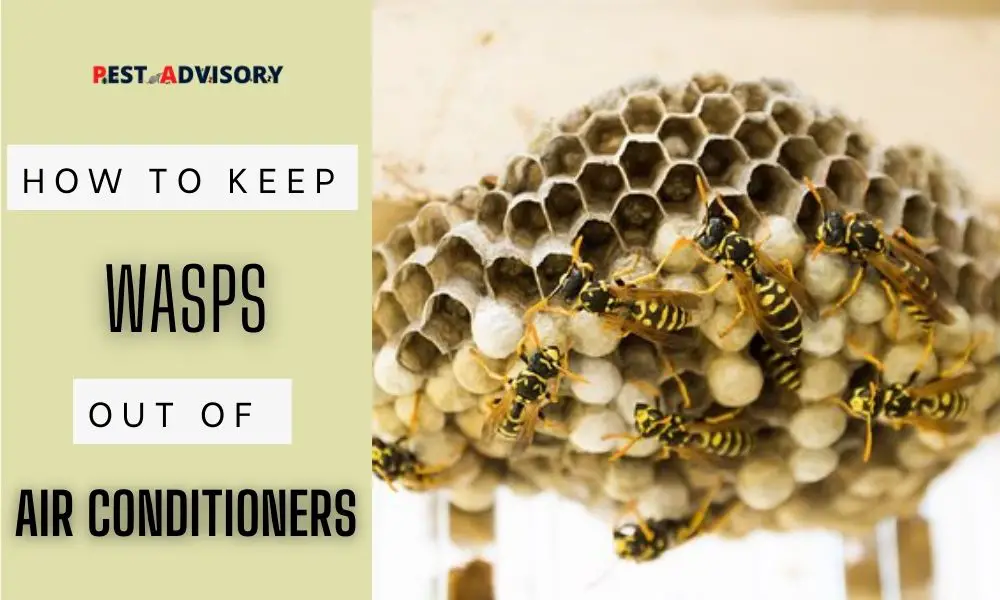Wasps nesting in AC vents and air conditioners can be a common problem that poses potential risks, dangers, and discomfort in HVAC (Heat, Ventilation, and Air Conditioning) systems.
These stinging insects can cause harm to humans and pets, as well as damage to your air conditioner.
You should safely remove wasp nests from your AC and prevent future infestations.
Important Note: If you're tired of pests and want a reliable solution, then you should definitely consider seeking help from a professional pest control company. DIY solutions can be effective, but if you're dealing with a significant pest infestation, you don't want to rely solely on DIY methods. Pest control companies typically don't charge huge fees. You can fill out this form to receive free quotes from the top local pest control companies, and compare the quotes and see for yourself. Then, finally, your pest problems will be eliminated for good.
Fill out our quick form below to connect with professionals and reclaim your air vent from wasps.
Dealing with wasps infiltrating your air conditioner can be a daunting task. In this comprehensive guide, we’ll explore effective strategies to prevent wasps from accessing your AC unit and causing havoc.
Further read the article to know about the common problem of wasps nesting in AC units and air conditioners, and highlight the potential risks, dangers, and discomfort caused by wasps.
Why are Wasps Attracted to Air Conditioner?
Wasps are attracted to windows or air conditioners for several reasons.
Warmth
Wasps are attracted to the warmth generated by the AC unit. Wasps are drawn to warm places, and the AC unit provides a cozy spot for them to build their nests.
Electromagnetic Radiation
Wasps are attracted to the electrical components of the AC unit, as they emit electromagnetic radiation that can be appealing to wasps.
Food Source
Another reason why wasps may be attracted to your windows or air conditioner is the availability of food sources.
Wasps are predators and scavengers, and they may be attracted to the air conditioner insects that are drawn to the moisture and warmth around the AC unit, such as flies, mosquitoes, and other small insects.
Wasps even build nests in air vent to have easy access to these food sources.
Safe Shelter
Wasps may be attracted to the sheltered location that AC vents provide.
Vents and ductwork can offer protection from the elements and provide a secluded area for wasps to build their nests, which can make your AC unit an appealing spot for them to establish their colonies.
How to Keep Wasps Out of Air Conditioners
Wasp Repellents
Citronella Oil
Citronella oil is a natural repellent that can be used to deter wasps. It can be applied to the areas around AC vents and air conditioners to create a barrier that to get rid of wasps in air vent.
Peppermint Oil
An alternative natural repellent for repelling wasps is peppermint oil. It can be mixed with water and sprayed around AC vents and air conditioners or used in sachets or cotton balls placed in strategic areas to stop wasps from coming through vent.
Wasp Traps
Hanging Traps
Hanging traps are designed to attract wasps with sweet baits and lure them into a trap where they are unable to escape.
These traps typically use a combination of sugary baits, such as fruit juice or syrup, to attract the wasps.
Bottle Traps
Bottle traps are a DIY option that involves cutting the top off a plastic bottle, inverting it, and securing it with tape to create a funnel shape.
Wasps are lured into the bottle with sweet bait, and once inside, they are unable to escape and are out of air conditioner.
Wasp Baits
Commercial Wasp Baits
There are various commercial wasp baits available in the market that can be used to attract and control wasps.
These baits are typically formulated with attractants that lure wasps and are designed to be used with specific types of wasp traps.
Homemade Baits
Homemade wasp baits can also be used, such as a mixture of sugar, water, and a protein source, such as meat or fish.
These baits can be placed in traps or in strategic areas around AC vents and air conditioners to attract and control wasps.
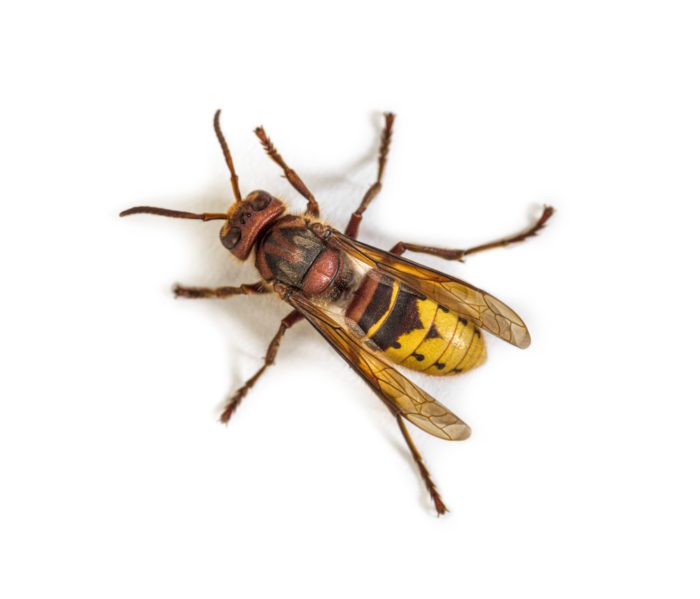
How to Remove Wasp Nests from AC Vents
Removing wasp nests from AC vents and air conditioners can be hazardous and requires proper precautions to ensure your safety.
Wear Protective Gear
Before attempting to remove a wasp nest from air conditioner, make sure to wear protective gear to minimize the risk of getting stung.
This includes wearing a long-sleeved shirt, pants, closed-toe shoes, gloves, and a beekeeper’s hat or veil to protect your face and head.
Observe the Wasps’ Activity
Observe the wasps’ activity around the nest from a safe distance to determine their flight pattern and the best time to remove the nest.
Wasps are generally less active during early morning or late evening when the temperatures are cooler.
Use Insecticide Spray (if needed)
If the wasp nest is small and accessible, you can use an insecticide spray labeled for wasps to treat the nest from a safe distance.
Follow the instructions on the label carefully and use the spray according to the manufacturer’s recommendations.
Do not stand directly underneath the nest and avoid spraying toward yourself or others.
Ed, Pest Control Expert from Orange, California, Whom we interviewed earlier, says “I would recommend using a product like EcoSmart Wasp and Hornet Killer. There are other products that are even more effective but should only be used by licensed professionals.”
Remove the Nest from Air Vents
According to Ed “First and foremost, it’s crucial to stay away from the nest during the day when wasps are active and highly defensive of their nest.” He also recommends “Avoid attempts to deal with any wasp nest other than an umbrella wasp.”
Once the wasps are inactive, you can carefully remove the wasp nest in air vent using a long-handled tool, such as a broom or a rake.
Gently knock down the nest and place it in a sealed plastic bag. Be cautious not to crush the nest or provoke any remaining wasps.
Dispose of the Nest Properly
Seal the bag containing the wasp nest tightly and dispose of it in a garbage bin with a secure lid. Do not attempt to burn the nest or leave it lying around, as this may attract other pests or wasps.
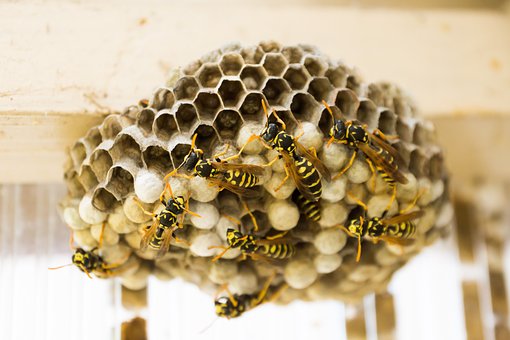
Risks and Concerns about Wasps in Air Conditioners
Having wasps in AC vents and air conditioners can pose several risks and dangers. It’s important to remove wasps from ACs and bathrooms because of these potential risks. Here are some key points to consider:
Stings and Allergic Reactions
Wasps are known for their aggressive behavior and can sting humans when they feel threatened. Wasps’ stings can be painful and cause redness, swelling, and itching.
In some cases, wasp stings can trigger severe allergic reactions that may result in anaphylaxis, a life-threatening condition.
This is especially concerning for individuals who are allergic to wasp venom.
Damage to the Air Conditioner Unit
Wasps may build their nests inside the AC vents, air conditioners, or other HVAC components, which can block airflow, reduce system efficiency, and increase energy consumption.
Additionally, wasps can chew through ductwork, insulation, and wiring, causing potential damage to the system and posing a fire hazard.
This can result in costly air conditioner repairs and decreased performance of the HVAC system.
Discomfort and Inconvenience
Wasps buzzing around the AC vents or air conditioners can create discomfort and inconvenience for homeowners or occupants.
Wasps can enter your apartment through small cracks or openings.
The presence of wasps can disrupt the normal functioning of the HVAC system and may require temporary shutdowns or restricted use of the system until the infestation is resolved.
This can result in discomfort due to a lack of cooling or heating during hot or cold weather, affecting the comfort and convenience of the living or working space.
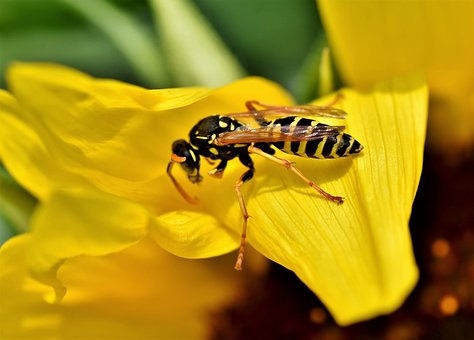
Frequently Asked Questions
Can Wasps Damage my Air Conditioner?
Yes, wasps can potentially damage your air conditioner if they build their nests too close to the important components of the unit.
For example, if a wasp nest is built near the condenser, it can block off airflow and cause the parts to overheat, which could lead to premature failure of the air conditioning system.
Additionally, if the nest is left unaddressed for a long time, it can reduce the efficiency of the air conditioner.
Can Wasps Get in Through Air Conditioners?
Yes, wasps can potentially get into air conditioners through gaps or openings in the unit or ductwork, or by building nests inside AC vents.
Regular maintenance, sealing gaps, and using screens can prevent wasp entry into air conditioners.
What should I do about a Wasp Nest in My Window Air Conditioner?
For a wasp nest in your window air conditioner, it’s important to prioritize safety. Wasps can get into your home through the AC vent.
Avoid disturbing the nest and seek professional help for safe removal.
Blocking the air conditioner to prevent wasp entry and using repellents can also be effective preventive measures.
How Often should I Check my Air Conditioner for Wasp Nests?
It’s recommended by heating and cooling experts to have your air conditioning unit inspected at least once per year, preferably before the warm season starts.
During this inspection, the technician should check for any wasp nests or signs of wasp activity in and around the unit.
If you notice any increased wasp activity around your air conditioner or suspect a nest may be present, you should check the unit more frequently and address the issue promptly.
Additionally, keeping an eye on your air conditioner and checking it periodically, especially during the spring and summer months when wasps are more active, can help prevent any potential issues.
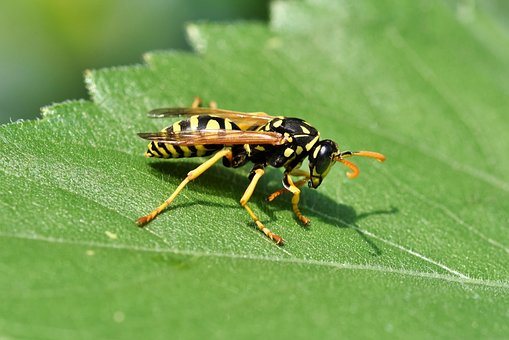
Conclusion
Dealing with wasp infestations in AC vents and air conditioners is crucial for the safety, comfort, and efficiency of your HVAC system.
By identifying the signs of wasp infestation, using effective repellents and traps, and safely removing wasp nests while following necessary precautions, you can mitigate the risks and prevent further damage.

